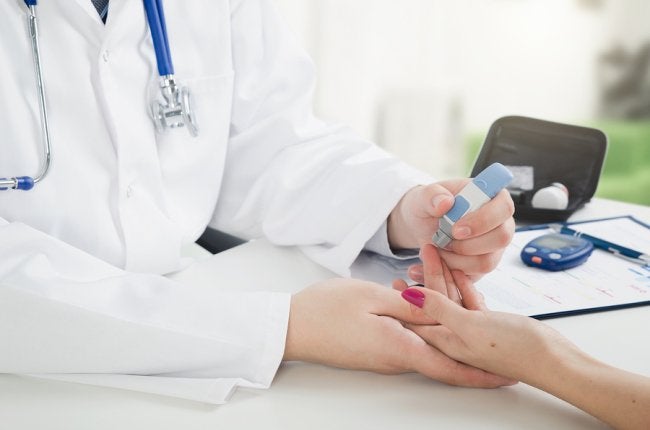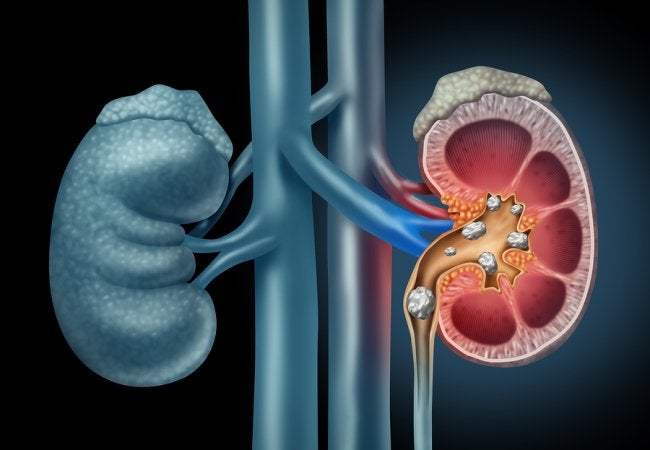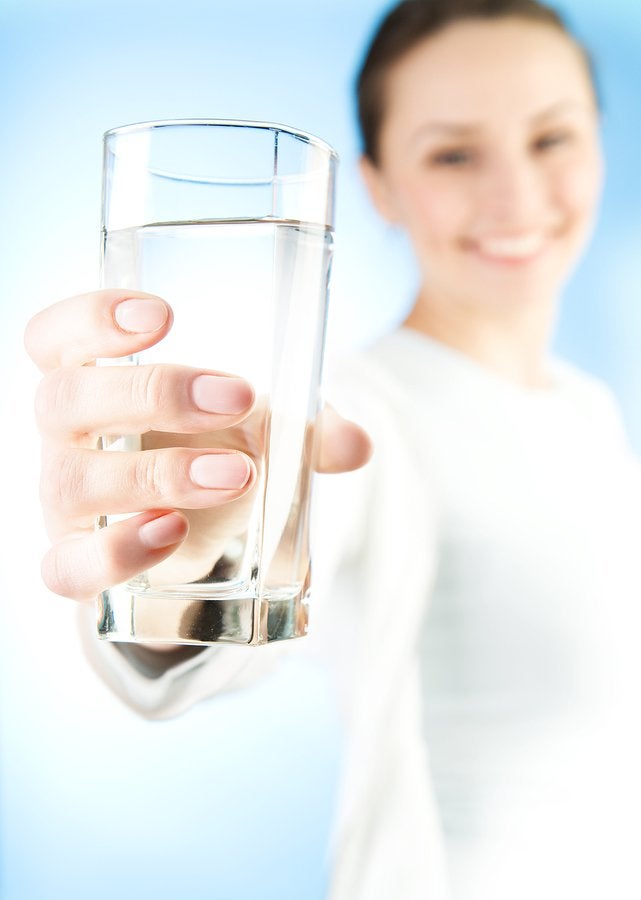-
A Look at Different Types of Kidney Stones
Kidney stones occur when minerals clump together inside the kidneys. If you see a urologist for kidney stone treatments, one thing he or she will try to do is determine what kind of kidney stones you have.
This video examines some of the different types of kidney stones. The type of stone is determined by the minerals it contains. By knowing what type of kidney stones you have, your urologist is able to give you better advice about how to prevent another attack in the future.
For kidney stones, UTIs, and more choose Urology Associates, P.C. for your care. You can learn more about all our services and schedule an appointment with a urologist in Nashville by calling (855) 901-1338.
-
Kidney Stones 101
Kidney stones occur when certain minerals build up and clump together in your kidneys. They are extremely painful, and in some cases, they may require surgery. It’s important to see your urologist as soon as you notice any symptoms that could indicate that you might have a kidney stone.
Watch this video to learn more about how kidney stones form and what you can do about them. Some kidney stones are small enough to pass on their own, but your urologist may suggest laser treatments or surgery for larger ones.
Urology Associates, P.C. offers comprehensive urology services for kidney stones, UTIs, sexual dysfunction, and much more. To make an appointment with a urologist in Nashville, please call (855) 901-1338.
-
Exploring the Link Between Diabetes and Kidney Stones

It is well-established that diabetes can increase the risk of kidney failure, particularly when it is poorly controlled. However, does the disease also increase the risk of kidney stones ? Here is what you need to know about the connection between diabetes and kidney stones and when you should see a urologist about your symptoms.
What are kidney stones?
Kidney stones are hard, stone-like formations of excessive calcium oxalate, struvite, uric acid, or cysteine. These substances can band together inside of your kidneys and form stones that range in size from minute to large and obstructive. When stones form, they eventually must pass out of your body through your urinary tract. Small stones can pass through your system with few, if any, symptoms. Large stones can be excruciatingly painful to pass and may get stuck in your urinary tract, where they can block the release of urine and trigger infections.
How does diabetes increase the risk of kidney stones?
Diabetes can increase the acidity of your urine. If your blood glucose levels are high, the acidity in your blood increases, which in turn causes the acid levels in your urine to increase. Acidic urine increases the risk of kidney stones. Following your diabetes care plan closely in order to control blood glucose and drinking plenty of water every day can help to reduce the risk.
When should you see a urologist for kidney stones?
See a urologist as soon as possible if you have symptoms of a kidney stone. These include nausea, vomiting, back pain, abdominal pain, and blood in the urine. If your stone is small, you may be able to pass it by increasing your water intake and using over-the-counter pain medicines. For large stones, your urologist may recommend procedures to break up the stone or surgical removal.
Urology Associates, P.C. provides treatment for a wide range of conditions, from UITs to kidney stones and bladder cancer. If you think you could have a kidney stone in Nashville, make an appointment by calling (855) 901-1338.
-
Don’t Fall for These Myths About Kidney Stones

The minerals and salts in a person’s urine can sometimes crystallize and clump together, forming a kidney stone. Urologists sort kidney stones into categories. Most of them are calcium stones. The other types include struvite, uric acid, and cysteine stones. Regardless of the type of stone you have, there’s no question that this problem can cause excruciating pain. The pain can be enough to drive some patients to try folk remedies, even though the treatment administered by a urologist is proven effective.
Myth: Kidney stone patients should decrease calcium intake.
Calcium is found in the majority of all kidney stones, but urologists do not recommend reducing your calcium intake to prevent them. In fact, some research suggests that lowering your calcium intake may increase your risk of getting kidney stones. Usually, these stones are made from calcium oxalate. Metabolic disorders and intestinal bypass surgery may increase the concentration of calcium oxalate in the urine. Other stones are made from calcium phosphate. Metabolic conditions, such as renal tubular acidosis, can contribute to calcium phosphate stone development. People who get migraines or have seizure disorders may also be more likely to develop these stones.
Myth: Once I’ve had kidney stones, I’m not likely to get them again.
Unfortunately, people who have had kidney stones once are indeed at a higher risk of getting them again. Your urologist can help you learn how to reduce your risk. The following steps can help:
- Drink more water
- Maintain a healthy body weight
- Follow a low-sodium diet
Myth: Drinking olive oil will help pass a stone.
You may have heard that drinking olive oil and lemon juice will help your kidney stone pass faster and with less pain. It’s thought that olive oil can serve as a lubricant. There’s no research to substantiate this folk remedy. However, there are medications that can help you pass the stone, or your urologist may recommend surgical intervention.
Here at Urology Associates, P.C., we understand how painful and uncomfortable kidney stones are. Our urology team in Nashville administers effective treatments with a patient-focused, compassionate approach. Call us at (855) 901-1338 today, and we’ll get you in as soon as possible.
-
How Do Kidney Stones Form?
Kidney stones are a particularly painful urologic condition, although significant medical advancements give patients more treatment options than ever before. You can hear about some of them when you watch this video, which features a board certified urologist at Urology Associates, P.C.
Dr. Charles Eckstein explains that kidney stones form when there is a high concentration of crystals in the urine. Over time, these crystals can develop into stones, which may remain small or grow larger. Patients who are treated for kidney stones can work with their urologists to manage their risk factors, which can help prevent recurrent stones.
Kidney stones are one of the many medical conditions treated at Urology Associates, P.C. Patients with kidney stones who live in Tennessee can call us at (855) 901-1338 to request a prompt appointment with an experienced urologist.
-
Reducing Your Risk of Kidney Stones

Kidney stones are comprised of hardened deposits of minerals and acid salts. Although the symptoms of kidney stones can vary in intensity, many women have said the pain is worse than childbirth. Not all kidney stones require surgical intervention, but it’s a good idea to consult a urology specialist for expert treatment. If you’ve been diagnosed with kidney stones once, you should know that you’re at risk of getting them again. The following tips can help you prevent recurrent stones.
Increase your water intake.
Drinking plenty of water is essential for your health in general and kidney stone prevention in particular. During hot weather and while exercising, increase your water intake even more. As a general rule of thumb, you’re drinking enough water if your urine is very lightly colored or clear.
Increase your consumption of plant-based proteins.
It’s thought that eating lots of animal-based proteins may increase the risk of developing kidney stones. Your urologist may ask that you limit beef, chicken, and pork. Organ meat is thought to be especially impactful regarding kidney stone development. Consider limiting your intake of eggs, poultry, seafood, and dairy products.
Avoid calcium supplements.
Although calcium can be found in kidney stones, the consumption of food sources of calcium doesn’t appear to influence the risk. However, your urologist may suggest that you avoid calcium supplements.
Reduce your sodium intake.
Managing your sodium intake is particularly important if your kidney stones were calcium oxalate or calcium phosphate stones. There are lots of sneaky sources of sodium in the average American diet. High amounts of sodium are found in deli meats and cheeses, bread, pizza, soup, canned foods, and even frozen vegetables that include sauces. An effective way to reduce your sodium intake is to avoid processed foods and takeout, and to cook with fresh ingredients at home instead.
If you do need kidney stone treatment within Tennessee, you can count on Urology Associates, P.C. Our urologists offer cutting-edge treatments and sound medical guidance you can trust. Call our office at (888) 329-7700 to request a prompt appointment.
-
What You Need to Know About Kidney Stones
Most people know kidney stones’ reputation for being painful, but what exactly are they, and how can your urologist treat them? Watch this video to find out.
Kidney stones occur when certain minerals build up in your urine and form clumps that then must be passed out of your body via your urinary tract. They can cause severe pain in the back and abdomen as they move around, particularly if they are large or have jagged edges. In some cases, kidney stone treatment may revolve around pain medication and drinking extra water, but for large stones, your urologist may recommend surgery or another method of breaking up the stone.
At Urology Associates, P.C. , our doctors offer care for kidney stones, UTIs, erectile dysfunction, and a long list of other conditions affecting the urinary system and sexual health. To make an appointment with a urologist in Tennessee, call (888) 329-7700.
-
Is There a Link Between Iced Tea and Kidney Stones?
Kidney stones are a very painful medical problem. In fact, some women describe the pain as being worse than childbirth. Kidney stones form as a result of hardened mineral deposits and urologists say that people who consume high amounts of oxalates could be at an increased risk. Along with spinach and chocolate, iced tea happens to have plenty of oxalates.
You can hear more about the link between iced tea and kidney stones by watching this brief video and consulting your urologist. The health expert interviewed here recommends drinking plenty of water with a lemon wedge to counteract the effects of the oxalates in iced tea.
Urology Associates, P.C. provides sophisticated kidney stone treatment options in Tennessee. If you need to see a urologist, you can give us a call at (855) 901-1338.
-
What You Should Know about Kidney Stones
Kidney stones develop over time from accumulations of hardened minerals. If you experience symptoms such as severe pain in the lower back, bloody urine, nausea, and vomiting, it’s time to see a specialist in urology to be evaluated for possible kidney stones.
You can hear more about this common urology condition by watching this interview with Dr. Howard Aubert, a urologist in Nashville at Urology Associates, P.C. Dr. Aubert explains one of the non-invasive treatment options available for kidney stone patients, which involves sending high-energy sound waves through the body to break up the kidney stone without injuring other tissues.
You can rely on Urology Associates, P.C. for superior patient care and sophisticated treatment options for kidney stones, kidney cancer, erectile dysfunction, and more. Call (888) 329-7700 today to schedule a consultation with Dr. Aubert or one of our other providers.
-
A Closer Look at Kidney Stone Disease
Kidney stone disease is a common problem treated by urologists in Tennessee, affecting about one in eight people. However, treating kidney stones is much more difficult than preventing kidney stones in the first place. This video from Urology Associates P.C. discusses the disease, as well as providing tips for preventing kidney stones.
If you believe you are suffering from kidney stones, contact the experts at Urology Associates P.C. We are Nashville’s leading urological care provider, with more than 75 years of experience and more than 30 urologists who treat patients at our various locations throughout Tennessee. Contact us online or call us at (888) 329-7700 to schedule a kidney stone screening with one of our experienced urologists. We also invite you to check out our website to learn more about the conditions we treat and the specialty services we provide, including the only free-standing urology surgery center in Middle Tennessee .
Recent Posts
categories
- Uncategorized
- Bladder Cancer
- Women's Sexual Health
- MonaLisa Touch
- Urology
- Urologist
- Erectile Dysfunction
- Kidney Cancer
- Incontinence
- Prostate
- MonaLisa Touch Laser Treatment
- Kidney Stones
- Urinary Tract Infections
- Event
- Sexual Dysfunction
- Testicular Cancer
- Prostate Cancer
- Urology Surgery Center
- urinary incontinence
- vaginismus
- noncoital pain disorder
- Hypoactive Sexual Desire Disorder
- Infographic
- provenge
- Xofigo
- robotic surgery
- hormone replacement
- diabetes
- renal cell carcinoma
- pelvic pain
- hematuria
- sexual health
- chronic testicular pain
- premature ejaculation
- Men's Health Clinic
- Dr. Melvin Seard
- Interstitial Cystitis
- vasectomy
- overactive bladder
- vaginal atrophy
- nocturia
- bladder infections
- urethral strictures
- Acute Epididymitis
- low sex drive
- circumcision
- pelvic floor dysfunction
- Peyronie's Disease
- prostatitis
- female sexual dysfunction
- varicocele
- difficult urination
- low libido
- PSA levels
- male fertility
- penile prosthesis
- prostatic intraepithelial neoplasia
- male infertility
- estrogen levels
- nurse navigator
- stress urinary incontinence
- vaginal yeast infection
- elevated psa
- painful sex
- adult circumcision
- epididymitis
- OAB
- kidney infection
- penile cancer
- pelvic organ prolapse
- Vasectomy Reversal
- bone health
- cystectomies
- clinical trials
- bloody urine
- Advanced Therapeutic Center
- WISH MedSpa
- neurogenic bladder
- WISH Team
- prostate biopsies
- BPH
- fecal incontinence
- lithotripsy
- osteoporosis
- kidney cysts
